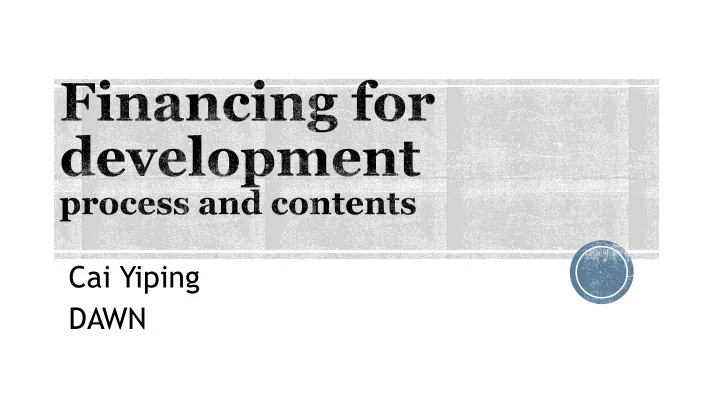

Cai Yiping DAWN
Political momentum and impact on post 2015 Date and venue : from 13 to 16 July 2015 Addis Ababa, Ethiopia. Who : It will gather high-level political representatives, including Heads of State and Government, and Ministers of Finance, Foreign Affairs and Development Cooperation, as well as all relevant institutional stakeholders, non-governmental organizations and business sector entities. Outcome : The Conference will result in an intergovernmentally negotiated and agreed outcome, which should constitute an important contribution to and support the implementation of the post-2015 development agenda. Thematic scope : Monterrey Consensus + “emerging issues” Balance between 1, 2 and 3 1. Assess implementation MC: obstacles and progress in 6 thematic areas: 1. Mobilizing domestic financial resources for development 2. Mobilizing international resources for development: foreign direct investment and other private flows 3. International trade as an engine for development 4. Increasing international financial and technical cooperation for development 5. External debt 6. Addressing systemic issues: enhancing the coherence and consistency of the international monetary, financial and trading systems in support of development. 2. New and emerging issues : 1. Current evolving development cooperation landscape, 2. The interrelationship of all sources of development finance, 3. The synergies between financing objectives across the three dimensions of sustainable development, 4. The need to support the United Nations development agenda beyond 2015; 3. Reinvigorating and strengthening the FfD follow-up process Co-facilitators: Ambassador George Talbot of Guyana and Ambassador Geir Pedersen of Norway Secretary-General for the Conference: Mr. Wu Hongbo, Under-Secretary-General for Economic and Social Affairs
2002 Monterrey Consensus -- establishing measures to increase domestic financial resource mobilization, increase the amount and quality of Official Development Assistance (ODA), solve the external debt problems, and orientate international trade as an engine for development, among other objectives 2008 Doha Declaration on Financing for Development -- there has been progress in some areas, but inequality has widened and interrelated global challenges, such as increase food insecurity, volatile energy and commodities prices, climate change and a global financial crisis, as well as the lack of results in the multilateral trade negotiations and a loss of confidence in the international economic system, are obstacles that have not been overcome. 2009, Conference on the World Financial and Economic Crisis and Its Impact on Development. Though the governments decided to strengthen the intergovernmental follow-up process regarding the agreements, there has been little progress in advancing the monitoring mechanisms in the FfD agenda. Developed countries' resistance to discuss the international economic and financial architecture within the framework of the United Nations continues to be a great obstacle for the implementation of the agenda.
1. The Form Affects the Content 2. The Emphasis on Private Finance Flows erodes the Responsibilities of the States 3. The Emphasis on Domestic Issues Dilutes the Principle of International Cooperation and Common but Differentiated Responsibilities. 4. The Emphasis on Multi-stakeholder Partnerships Affects Partnerships between Developed and Developing Countries Based on the Principle of International Cooperation 5. The Emphasis on the Need of Synergies between the FfD Process and the Post-2015 Development Agenda Can End Up Reducing and Weakening Commitments in Both Fronts
Regional Refocus Language map on zero draft Women Working Group on FfD on zero draft and 2 nd draft
Theme North/South tension Agreements, accountabily, Goals vs means conditionalities FSD vs FfD Domestic resource mobilization Policy space and IFIs Private capital flows and finance FDI impacts , “ blending ” (PPP) Enabling environment vs accountability: safegards and risk sharing Innovative, all sources vs complem. Not subst. Trade Liberalization vs protectionism, WTO vs bilateral, regional new round of Free Trade Agreements, International Investment Regime, TRIPs, Special and Differential Treatment, less-than-full reciprocity Debt Governance: International workout mechanism ODA Target, additionality, predictability, tied aid, grant/loan proportion, South-South Cooperation Taxation, illicit capital flows Domestic tax vs international cooperation Systemic issues UN vs G20,OECD and IFI’s
Developed countries attempt to focus FfD deliberations on promoting domestic resource mobilization and private sector engagement dilutes their responsibilities under the principle of international cooperation and Common But Differentiated Responsibilities (CBDR) and the central role of states as duty bearers. Furthermore, developed countries highlight the importance of promoting "gender equality and women's human rights" and they issued a joint statement on GE, but their lack of political will to address systemic issues under the FfD track, including the global structural obstacles in terms of trade, investment, tax and finance that limit policy space to orientate development strategies towards gender equality and the respect of the rights of women and girls make this promise just rhetoric. Thirdly, developed countries attempt to reduce FfD to the MoI of Post2015 is gaining momentum but developing countries still trying to keep the integrity of the FfD mandate.
III FfD Conference: http://www.un.org/esa/ffd/third-conference-ffd/index.htm Doha Review Conference: http://www.un.org/esa/ffd/doha/documents/Doha_Declaration_FFD.pdf SR Report on fiscal policy and Human Rigths: http://www.ohchr.org/EN/Issues/Poverty/Pages/AnnualReports.aspx Women’s Working Group on FfD: www.wwgonffd.org DAWN: www.dawnnet.org https://www.facebook.com/RegionsRefocus?fref=nf Regional refocus: Regions Refocus Language Map on Financing for Development (FfD3) Zero Draft Regional Refocus, DAWN and TWN: A Geopolitical Analysis of Financing for Development (FfD3)
Recommend
More recommend